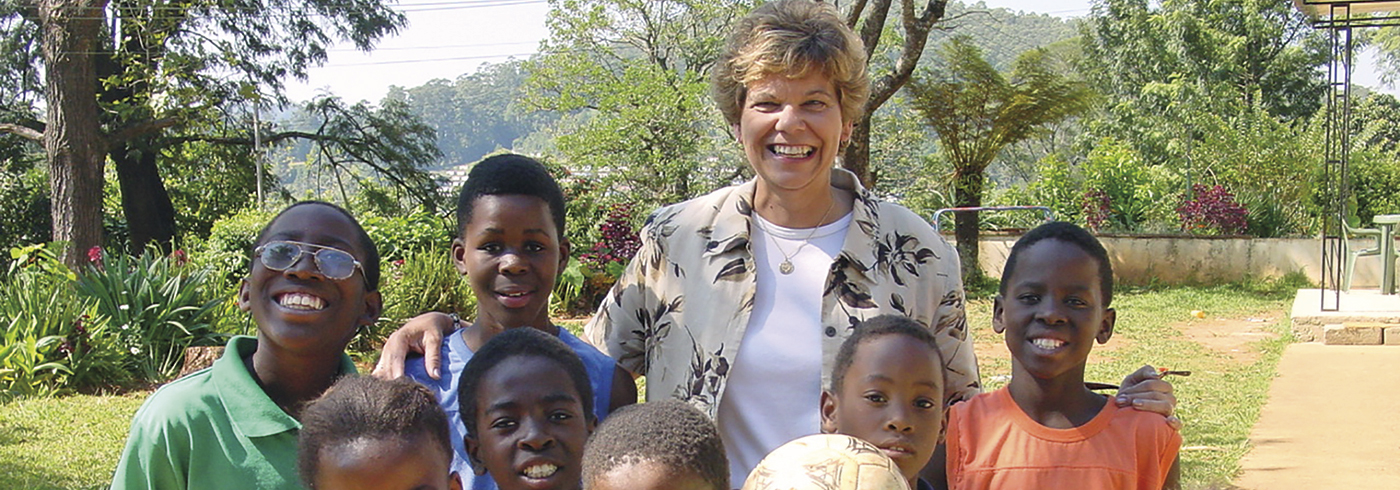Promoting Health in a Hurting World
A Q&A with Joann Butrin, R.N., Ph.D.
JoAnn Butrin began her missionary career as a registered nurse serving in the Democratic Republic of the Congo for 14 years. She is now director of both CompassionLink (formerly HealthCare Ministries) and International Ministries for Assemblies of God World Missions (AGWM). Butrin believes in a holistic approach to missions, sustainable development, community health, HIV/AIDS relief, and social justice.
INFLUENCE: How has the COVID-19 pandemic changed the way church leaders think about community health?
BUTRIN: As a person educated in public health, I have always been a little wary of the suggestion at the end of a song service to “shake hands with at least five people.” I wanted to reach for the hand sanitizer after that exercise but didn’t want to insult the people around me. I wasn’t thinking of a dangerous virus but more a cold or flu.
The onset of COVID-19 has helped church leaders rethink some of those rituals that have been part of our church tradition for so long. As churches begin to reopen, I believe church leadership will be making decisions to not return to handshakes, hugs, common Communion cups, and so on, and will find other ways to create vibrant community.
How did God call you to work in the areas of health care and community development?
I grew up in a pastor’s home where we hosted missionaries like Lillian Trasher, a nurse and director of an orphanage in Egypt. I think God used her to soften my heart. Not long after her visit, while kneeling at an altar, I was called to be a missionary nurse in Africa.
I received nursing training, and at the age of 22 left for the Democratic Republic of the Congo, where I served in a small hospital and outpatient clinic.
“As communities of faith grow, they are being established with a DNA of compassion and an outward focus to help others.”
— JoAnn Butrin
My interest began to turn toward public/community health because I realized so much of what we were treating was preventable. I returned to school on my furloughs and focused on health education, community health and preventable diseases. We began to develop training materials, procuring vaccinations, and doing all we could do to ensure clean water and proper sanitation.
I later pursued a Ph.D. in community health and medical anthropology. These degrees have served me well as I have had opportunities to lead ministries with similar focus and to teach and train globally.
Why are health care and community development biblical mandates?
The Bible is a revelation of the heart of God for His people. He speaks of the poor, widows, orphans, and homeless, and He instructs us to care for them. He says when you care for the poor, you “will lack nothing” (Proverbs 28:27). We are told to plead for mercy for the fatherless and do justice and mercy for all (Micah 6:8).
In Luke 10, we find the beautiful Parable of the Good Samaritan where the kindheartedness of the Samaritan went to immediate care (relief) but also provided for ongoing care for the injured man (development).
Many times, our Western tendency may be to provide relief — food, clothing, etc. — when the situation is not an emergency but is rather a chronic issue that needs long-term and sustainable solutions. It is much easier, faster and more fulfilling to provide relief, but this often creates dependency and doesn’t really help people to help themselves.
How do health care and community development relate to the Great Commission?
The wonderful part of coming alongside people to find solutions for their life issues together is that it provides opportunities for relationship. And in that relationship, there is opportunity to share about faith in Jesus. As communities of faith grow, they are being established with a DNA of compassion and an outward focus to help others.
What does CompassionLink do, and how can readers get involved with it?
CompassionLink is an international AGWM ministry developed to serve a hurting world. It is a Christ-centered, development-based approach to helping people help themselves by training in community health evangelism, agriculture, fish farming, fuel conservation and basic health screening methods.
Please visit Compassionlink.org for more information.
This article originally appeared in the September/October 2020 edition of Influence magazine.
Influence Magazine & The Healthy Church Network
© 2025 Assemblies of God

